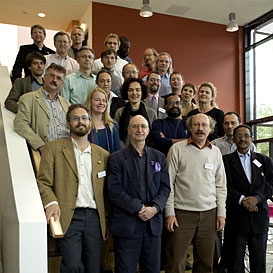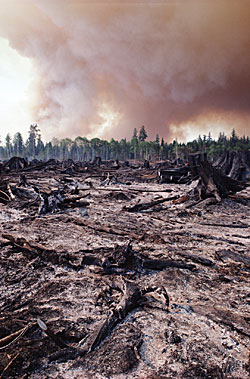Press release October 11th, 2006
Biodiversity issues need a better communication on knowledge
Workshop in Leipzig provides recommendations
Leipzig. To reverse the ongoing loss of biological diversity, a consistently improved dialogue between science, public and decision-making is necessary. To identify needs and gaps of existing mechanisms and to discuss new options, a group of international experts met at the Centre for Environmental Research (UFZ) in Leipzig, Germany. This group of highly experienced scientists, practitioners, and representatives of national and international institutions as much as of civil society organisations agreed on recommendations to improve the interface between bearers of knowledge and policy-actors.

Workshop participants
Foto: UFZ

Worldwide the biodiversity is at risk because of human activities.
Source: PhotoDisc® - Environmental Concerns
These recommendations contribute to ongoing debates about how to identify the optimal niche and conditions for the creation of an independent and effective scientific advisory body. The workshop recommends that such a body should include not only science, but all relevant knowledge, and therefore calls its proposal a "knowledge-policy interface". Such knowledge-policy interface is essential to support more effective biodiversity-related decision making and societal responses to the challenges of achieving sustainable development.
Over the last years, a variety of conventions and other measures have been agreed at the international as much as on other levels to stop the loss of biodiversity. However, there is broad consensus that all these measures have not been able to reverse this trend. Biodiversity change is a very complex cross-cutting issue which is dealt with in a broad variety of institutions directly or indirectly, up from the local to the global level. The Millennium Ecosystem Assessments, published recently, focused in this regard on the role of biodiversity for ecosystem services, such as nutrition and shelter up to health or flood protection and recreation, and on the vital threats connected with its loss. Therefore, relevant knowledge is very diverse and, as has been emphasised at the workshop, includes scientific as well as traditional knowledge. Also due to this diversity, models of science-policy interfaces working effectively e.g. for climate issues (such as the IPPC) cannot be transferred directly to the field of biodiversity.
It becomes more and more urgent to know how to improve existing measures and their implementation. Politicians as much as scientists, thus, emphasise the need to improve the science-policy interface in biodiversity. In early 2005, a large conference in Paris, l aunched by the French President Jacques Chirac, started an international negotiation process to create an International Mechanism on Expertise on Biodiversity (IMoSEB). Until June 2007, an ongoing consultative process discusses the needs and options for a new mechanism. In July 2006, a group of distinguished scientists and policy experts called in an article in Nature to create a new global coordinating mechanism to provide united scientific voice to stop the “major biodiversity crises”. The Leipzig Recommendations constitute a major milestone in these consultations by highlighting the specifics of such a mechanism with regard to its mandate, internal process as well as its outputs and outcomes.
Links:
Nature-Artikel "Diversity without representation":
www.nature.com/nature/journal/v442/n7100/full/442245a.html
IMoSEB:
Workshop participants
download list of participants (0,3 MB)
More information:
Dr. Christoph Görg / Dr. Heidi Wittmer / Dr. Silke Beck / Dr. Felix Rauschmayer
Helmholtz Centre for Environmental Research – UFZ
phone +49 345 558-2883, -2074, -2235, -2345
- www.ufz.de/index.php?de=4986
- www.ufz.de/index.php?de=1672
- www.ufz.de/index.php?en=5770
- www.ufz.de/index.php?de=1660
or
Doris Böhme / Tilo Arnhold,
Public Relations of Helmholtz Centre for Environmental Research – UFZ
Phone: +49-341-235-2278
E-mail: presse@ufz.de
